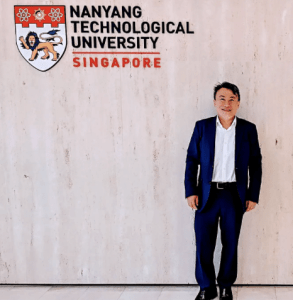By Bella Cox and Liby Navarro
Dr. Joe Phua is a Professor and the Endowed Distinguished Chair at the Temerlin Advertising Institute at Southern Methodist University. In 2011, he earned his Ph.D. from the Annenberg School for Communication at the University of Southern California. Throughout his career, Dr. Phua has worked with over $4.5 million in external research funded by distinguished organizations. His research has explored new communication technologies, their impact on advertising and branding, and their application in sports marketing and health communications and have been featured in significant media outlets such as ABC News and National Public Radio (NPR).
Through his published work in some of the utmost journals, including the Journal of Advertising and Journal of Consumer Behavior, Dr. Phua has won awards from the International Communication Association (ICA), American Academy of Academy (AAA), and the International Communication Association (ICA), among many others.
His most recent research titled, “Encouraging Positive Dialog Toward COVID-19 Vaccines on Social Media Using Hope Appeals, Celebrity Types, and Emoticons” was published in the journal, Mass Communication & Society, and was conducted in conjunction with an international team of colleagues from Washington State University, National Yang Ming Chiao Tung University, and the University of Melbourne. This study evaluates how utilizing hope appeals, celebrity endorsements, and value emoticons shaped attitudes about COVID-19 vaccinations. In addition, it discusses ongoing research to refine messaging strategies and improve the effectiveness of public health campaigns.
For this research, Dr. Phua and his colleagues were interested in examining how social media posts by celebrity endorsers can influence their followers’ attitudes towards the COVID vaccine. Two experiments were conducted in the study:
In experiment one, they tested three celebrity endorser types (politician, scientist, athlete) and two message types (high and low relevance hope appeal). This experiment revealed that politicians posting low relevance hope appeal messages had the strongest effect on changing attitudes towards the COVID vaccine.
In experiment two, three emoticon types (positive, neutral, negative) and the same two message types (high and low relevance hope appeal) were used. It was concluded that neutral emoticons (wow, haha), rather than positive (like, love, hug) or negative (sad, angry) emoticons, had the strongest effect on changing attitudes towards the COVID vaccine.
For both experiments, it was concluded that the more someone strongly identified with the celebrity endorser posting the message, the more strongly their attitudes towards the COVID vaccine were changed.
Dr. Phua emphasized that “through examining COVID vaccine messages, this study was helpful to healthcare organizations who can be better prepared to use the most effective social media-based message strategies to combat and mitigate any major health pandemics that may arise in the future in the wake of the COVID-19 global pandemic.”
In addition, Dr. Phua recently visited Nanyang Technological University in Singapore to initiate research and teaching collaborations.

